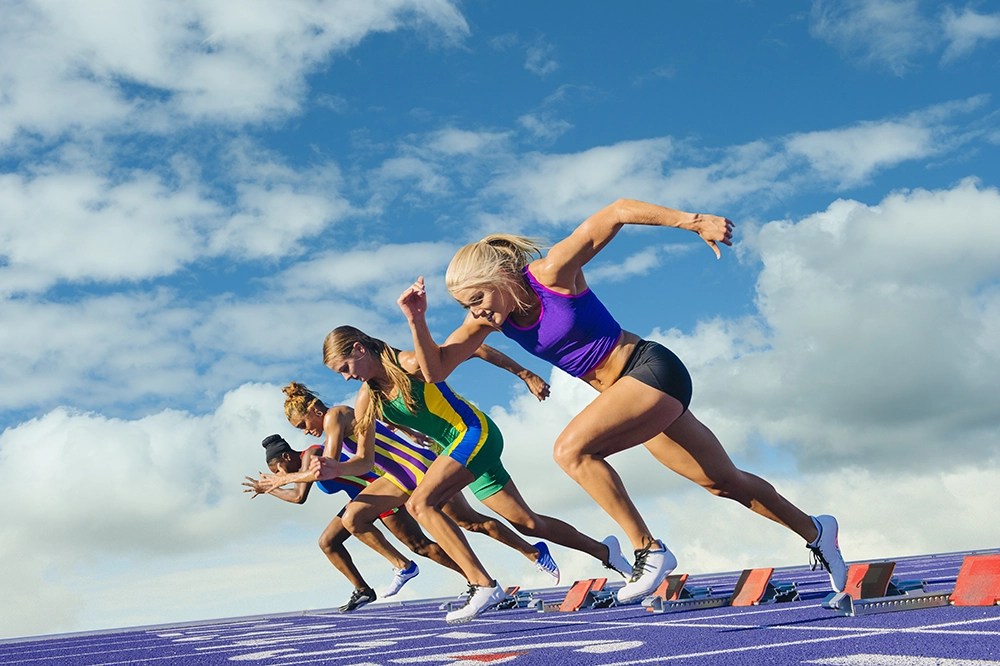Performance-Boosting Chinese Herbs: Enhancing Athletic Performance Naturally
Are you looking to take your athletic performance to the next level? You might want to consider turning to an ancient source of wisdom: performance-boosting Chinese herbs. For thousands of years, traditional Chinese medicine has used these powerful plants to enhance physical and mental capabilities. Now, Olympic athletes are discovering their potential to improve stamina, speed recovery, and boost overall performance.
Chinese herbs have been used to enhance physical performance long before energy drinks and synthetic supplements hit the market. They offer a natural approach to boosting energy levels, reducing exercise-induced fatigue, and supporting overall health. From Olympic champions to everyday fitness enthusiasts, more and more people are turning to these time-tested remedies to gain an edge in their training and competition.
But what exactly are these herbs, and how do they work? How can they help you push your limits and achieve your athletic goals?
In this comprehensive guide, we’ll explore the fascinating intersection of traditional Chinese medicine and modern sports science to uncover the secrets of performance-boosting Chinese herbs. Whether you’re a weekend warrior or a professional athlete, understanding how these herbs can support your fitness goals could be a game-changer.
So, get ready to learn about the herbs that could transform your workout routine, speed up your recovery, and potentially take your athletic performance to new heights.
Understanding Traditional Chinese Medicine (TCM) and Athletic Performance
Traditional Chinese Medicine (TCM) is a holistic healing system that’s been around for over 2,000 years. It’s based on the idea that health depends on the balance of qi (pronounced “chee”), which is the vital energy that flows through our bodies. When it comes to athletic performance, TCM takes a unique approach that’s quite different from Western medicine.
In TCM, peak athletic performance isn’t just about strong muscles or cardiovascular endurance. It’s about harmonizing your entire body and mind. This includes balancing your internal organs, optimizing energy flow, and nourishing your body’s essence. Chinese herbal medicine plays a crucial role in achieving this balance.
Traditional Chinese Medicine practitioners believe that different herbs can target specific aspects of health and performance. For example, some herbs might boost energy levels, while others could improve blood circulation or reduce inflammation. By combining these herbs in specific formulas, TCM aims to create a comprehensive approach to enhancing athletic performance.
Here’s how TCM views some key aspects of athletic performance:
- Energy (Qi): This is the foundation of all physical activity. In TCM, herbs that tonify qi can help increase stamina and reduce fatigue.
- Blood: Good blood circulation is essential for delivering oxygen and nutrients to muscles. Certain herbs are used to nourish blood and improve circulation.
- Yin and Yang: These opposing forces need to be in balance. Yang energy is associated with heat and activity, while Yin is cooling and nourishing. Balancing these can help with both performance and recovery.
- Organ systems: Each organ system plays a role in athletic performance. For instance, the Kidney system is associated with willpower and endurance, while the Liver system is linked to flexibility and decision-making.
- Mental focus: TCM recognizes the importance of mental clarity and focus in athletics. Some herbs are specifically used to calm the mind and improve concentration.
By addressing all these aspects, TCM aims to create a well-rounded approach to boosting athletic performance. It’s not just about being faster or stronger – it’s about creating a balanced, harmonious body that can perform at its best.
In the world of sports, where milliseconds and millimeters can make the difference between victory and defeat, more athletes are turning to TCM for that extra edge. They’re finding that these ancient practices can complement modern training methods, potentially leading to improved performance and faster recovery.
As we delve deeper into specific performance-boosting Chinese herbs, keep in mind this holistic approach. Each herb isn’t just addressing a single symptom or body part – it’s part of a larger system aimed at optimizing your overall health and athletic potential.
The Top Performance-Boosting Chinese Herbs
Let’s discuss some of the most popular and effective Chinese herbs known for enhancing athletic performance. These herbs have been used for centuries in traditional Chinese medicine and are now gaining recognition in the world of sports and fitness.
Ginseng (Panax ginseng)
Ginseng is perhaps the most well-known Chinese herb for boosting performance. It’s often called the “king of herbs” in TCM. Here’s why athletes love it:
- Increases energy levels and reduces fatigue
- Improves mental focus and cognitive function
- Enhances physical endurance
- Supports immune function
Studies have shown that ginseng can help improve exercise performance and reduce exercise-induced fatigue. For example, a study published in the Journal of Strength and Conditioning Research found that ginseng supplementation improved endurance exercise performance in healthy adults.
Astragalus (Huang Qi)
Astragalus, known as Huang Qi in Chinese, is a powerful herb for boosting overall vitality. Athletes use it for:
- Strengthening the immune system
- Improving cardiovascular function
- Reducing inflammation
- Enhancing stamina and endurance
Research suggests that astragalus may help improve exercise performance by increasing the body’s ability to use oxygen efficiently.
Cordyceps
Cordyceps is a unique fungus that’s highly prized in TCM for its performance-enhancing properties. Benefits for athletes include:
- Boosting oxygen utilization
- Enhancing aerobic capacity
- Improving exercise performance
- Speeding up post-workout recovery
A study published in the Journal of Alternative and Complementary Medicine found that cordyceps supplementation improved exercise performance in healthy older adults.
Rhodiola
Rhodiola is an adaptogenic herb that helps the body adapt to stress. For athletes, it offers:
- Increased endurance and stamina
- Reduced mental and physical fatigue
- Improved recovery time
- Enhanced cognitive function during intense physical activity
Research showed that rhodiola supplementation reduced perceived exertion and improved endurance exercise performance.
Ginkgo Biloba
While often associated with cognitive health, ginkgo biloba also offers benefits for physical performance:
- Improves blood circulation
- Enhances oxygen utilization
- Reduces inflammation
- Supports cognitive function during exercise
One study found that ginkgo biloba supplementation improved endurance performance in healthy young adults.
Ginger (Sheng Jiang)
Ginger is widely used in both culinary and medicinal applications in TCM. For athletes, it offers:
- Anti-inflammatory and antioxidant properties
- May help reduce exercise-induced muscle pain
- Potential to improve circulation
- Supports digestive health
Research indicates that ginger supplementation might also help reduce muscle pain following strenuous exercise.
Eucommia (Du Zhong)
Eucommia, also known as Hardy Rubber Tree bark, is valued in TCM for its potential to support:
- Joint and bone health
- Lower back and knee strength
- Overall endurance and stamina
- Stress reduction
Turmeric (Jiang Huang)
While not traditionally considered a Chinese herb, turmeric has gained popularity in TCM and sports nutrition for its potential benefits:
- Powerful anti-inflammatory properties
- May help reduce exercise-induced muscle damage
- Supports joint health
- Potential to enhance recovery after intense workouts
Some studies suggest that curcumin, the active compound in turmeric, may help reduce muscle soreness and inflammation after exercise.
These herbs represent just a fraction of the Chinese herbs available. Each offers unique benefits that can support different aspects of athletic performance. However, it’s important to remember that these herbs work best as part of a balanced approach to training and nutrition.
When considering adding these herbs to your regimen, it’s always best to consult with a qualified TCM practitioner or healthcare provider. They can help you determine the right herbs and dosages for your specific needs and goals. Remember, what works for one athlete may not work the same way for another – individualized care is key in both TCM and modern sports medicine.
The Benefits of Chinese Herbs for Athletes
Chinese herbs offer a wide range of benefits that can significantly enhance athletic performance. Let’s break down these benefits into key areas that matter most to athletes:
Enhancing Physical Performance
- Increased Endurance: Many Chinese herbs, like ginseng and cordyceps, can help athletes push their limits and train longer. They work by improving oxygen utilization and reducing the perception of fatigue.
- Improved Strength: Some herbs are known to support muscle function and growth, potentially leading to increased strength over time when combined with proper training.
- Better Cardiovascular Function: Herbs like astragalus and ginkgo biloba can improve blood flow and heart health, which is crucial for endurance athletes.
Improving Mental Focus and Cognitive Function
- Enhanced Concentration: Herbs like ginkgo biloba are known for their ability to improve focus and mental clarity, which can be a game-changer during intense competition.
- Stress Reduction: Adaptogenic herbs like rhodiola help the body manage stress, allowing athletes to stay calm and focused under pressure.
- Improved Reaction Time: Some Chinese herbs may help improve neural pathways, potentially leading to faster reaction times – a crucial factor in many sports.
Reducing Fatigue and Speeding Recovery
- Faster Recovery: Herbs with anti-inflammatory properties can help reduce muscle soreness and speed up recovery between training sessions.
- Reduced Exercise-Induced Fatigue: Many Chinese herbs help combat fatigue, allowing athletes to train harder and recover faster.
- Better Sleep Quality: Some herbs can improve sleep quality, which is essential for recovery and overall athletic performance.
Supporting Immune Function
- Strengthened Immune System: Herbs like astragalus are known for their immune-boosting properties, helping athletes stay healthy and maintain consistent training.
- Reduced Risk of Overtraining: By supporting overall health, these herbs may help prevent the immune suppression that can occur with intense training.
Additional Benefits
- Improved Nutrient Absorption: Some Chinese herbs can enhance digestion and nutrient absorption, ensuring athletes get the most from their diet.
- Hormonal Balance: Certain herbs may help maintain healthy hormone levels, which is crucial for both performance and recovery.
- Antioxidant Support: Many Chinese herbs are rich in antioxidants, which can help combat exercise-induced oxidative stress.
It’s important to note that while these benefits are promising, the effects can vary from person to person. Factors like individual physiology, dosage, and quality of herbs all play a role in their effectiveness.
Moreover, these herbs aren’t magic pills that instantly boost performance. They work best when integrated into a comprehensive training program that includes proper nutrition, adequate rest, and consistent exercise.
For athletes considering adding Chinese herbs to their regimen, it’s important to approach them with the same seriousness as any other aspect of training. This means doing research, consulting with professionals, and carefully monitoring their effects on your performance and overall health.
Historical and Current Use in Athletics
While scientific studies provide valuable insights, the use of Chinese herbs for enhancing performance is deeply rooted in centuries of traditional knowledge and practical application.
Historical Use
Chinese herbs have been used for thousands of years to boost vitality and performance. This long history provides valuable insights into their potential benefits. Ancient texts like the “Compendium of Materia Medica” (Bencao Gangmu) document the use of herbs like ginseng and astragalus for enhancing strength and endurance.
Traditional Chinese Medicine (TCM) practitioners have extensive clinical experience using these herbs to treat various conditions and enhance overall health, including athletic performance. Their observations and case studies, while not scientific trials, offer valuable real-world data on the effects of these herbs.
Current Use in Elite Sports
The world of elite sports, including the Olympic Games, has seen a growing interest in Chinese herbs as a means to enhance performance naturally. While it’s important to note that athletes must always ensure they’re using substances that comply with anti-doping regulations, many have found success incorporating Chinese herbs into their training regimens.
Yao Ming, the former NBA star and one of China’s most famous athletes, turned to traditional Chinese medicine during his career. After undergoing foot surgery in 2008, Chinese officials announced that traditional Chinese remedies would be used to aid his recovery. While specific herbs weren’t disclosed, this high-profile case brought attention to the potential of Chinese medicine in sports recovery. It demonstrated how even at the highest levels of professional sports, traditional remedies are still valued and integrated with conventional medical treatments.
While definitive statements about herb use cannot be made without direct confirmation, some notable athletes that reportedly used aspects of Traditional Chinese Medicine include tennis star Novak Djokovic and the late basketball legend Kobe Bryant, which suggests that they may have been willing to explore various aspects of this traditional approach to health.
It’s also worth noting that the specific details of an athlete’s regimen are often not public knowledge. This is partly due to the competitive nature of sports and partly because many athletes use personalized formulas developed by TCM practitioners.
For any athlete considering the use of Chinese herbs, it’s important to:
- Consult with a qualified TCM practitioner and a sports medicine doctor
- Ensure all substances comply with relevant anti-doping regulations
- Start with small doses and monitor effects carefully
- Remember that herbs are supplements to, not replacements for, proper training, nutrition, and rest
As the worlds of traditional medicine and modern sports science continue to intersect, we may see even more innovative approaches to enhancing athletic performance naturally.
In the meantime, athletes interested in exploring Chinese herbs should work with knowledgeable practitioners who can guide them in using these herbs safely and effectively. These experts can draw on both traditional wisdom and modern understanding to create personalized approaches for enhancing athletic performance.
Incorporating Chinese Herbs into Your Fitness Routine
If you’re interested in using performance-boosting Chinese herbs to enhance your athletic performance, it’s important to approach it thoughtfully and safely. Here’s how you can incorporate these herbs into your fitness routine:
Tips for Successful Integration
- Combine with Proper Nutrition: Herbs work best when combined with a balanced, nutrient-rich diet.
- Stay Hydrated: Many herbs have a diuretic effect, so ensure you’re drinking plenty of water.
- Listen to Your Body: Pay attention to how you feel and perform. Keep a journal to track any changes.
- Be Patient: It can take weeks or even months to notice significant effects from some herbs.
- Cycle Your Herbs: Some practitioners recommend taking breaks from herbs periodically to prevent tolerance.
- Combine with Other Recovery Techniques: Use herbs alongside other recovery methods like proper sleep, stretching, and massage.
- Inform Your Coach or Trainer: If you’re working with a fitness professional, let them know about your herb use so they can help monitor your progress.
Dosage and Timing Recommendations
- Start Low and Go Slow: Begin with a lower dose than recommended and gradually increase it. This allows you to monitor how your body responds.
- Consistency is Key: Most Chinese herbs work best when taken regularly over time. Don’t expect overnight miracles.
- Timing Matters: Some herbs are best taken before workouts for energy, while others are more suitable for post-workout recovery. For example:
- Ginseng: Often taken 1-2 hours before exercise
- Cordyceps: Can be taken daily for overall stamina
- Rhodiola: Often used 30-60 minutes before intense physical or mental activity
- Astragalus: Typically taken daily for immune support and overall vitality
- Ginger: Can be taken before or after exercise; some athletes use it before workouts to improve circulation, or after for its anti-inflammatory effects
- Eucommia: Often taken daily for long-term joint and bone support
- Turmeric: Typically taken post-workout or daily for its anti-inflammatory properties and to support recovery
- Follow Expert Guidance: Always follow dosage instructions from a qualified TCM practitioner or the product label.
Potential Interactions and Precautions
- Check for Interactions: Some Chinese herbs can interact with medications. If you’re on any prescriptions, consult your doctor before starting any new herbs.
- Be Aware of Side Effects: While generally safe, some people may experience side effects. Common ones include digestive upset or headaches.
- Quality Matters: Use high-quality herbs from reputable sources. Poor quality products may be ineffective or even harmful.
- Avoid During Pregnancy: Many herbs aren’t recommended during pregnancy or breastfeeding. Always consult a healthcare provider in these situations.
- Consider Your Overall Health: Some herbs may not be suitable for people with certain health conditions. For instance, ginseng may not be appropriate for people with high blood pressure.
- Watch for Allergic Reactions: Although rare, allergic reactions can occur. Stop use and seek medical attention if you experience any signs of an allergic reaction.
Remember, Chinese herbs aren’t a substitute for proper training, nutrition, and rest. They’re tools that, when used correctly, can complement your existing fitness routine and potentially enhance your performance.
As with any supplement, it’s important to do your research and consult with professionals. A TCM practitioner can help create a personalized herbal regimen based on your individual needs and goals. And don’t forget to check with your sport’s governing body to ensure any herbs you’re considering are allowed in competition.
By approaching Chinese herbs with respect and caution, you may find they become a valuable addition to your athletic toolkit, helping you reach new levels of performance and well-being.
Harnessing Ancient Wisdom for Modern Performance
Performance-boosting Chinese herbs offer a fascinating blend of ancient wisdom and modern athletic science. As we’ve explored throughout this article, these natural remedies have the potential to enhance various aspects of athletic performance, from boosting energy and endurance to improving recovery and mental focus.
Chinese herbs like ginseng, astragalus, cordyceps, rhodiola, and ginkgo biloba have shown promising results in supporting athletic performance. These herbs work holistically, addressing not just physical performance but also mental focus, recovery, and overall health.
Scientific research is increasingly validating traditional uses of these herbs, though more studies are needed. Many top athletes have incorporated Chinese herbs into their training regimens with reported success.
As with any performance-enhancing strategy, it’s necessary to approach Chinese herbs with a balanced perspective. They’re not magical solutions, but rather tools that can complement a well-rounded training program. The key is to use them thoughtfully and in conjunction with proper nutrition, training, and recovery practices.
Ultimately, the journey to peak performance is a personal one. What works for one athlete may not work for another. That’s why it’s important to listen to your body, track your progress, and work closely with health professionals as you incorporate new elements into your routine.
Whether you’re a competitive athlete aiming for the podium or a weekend warrior looking to improve your personal best, Chinese herbs might just be the natural boost you need to take your performance to the next level.
For those interested in exploring the potential of performance-boosting Chinese herbs, remember that quality matters. To ensure you’re getting high-quality Chinese herbs and supplements, consider purchasing them on Acuatlanta.net. We offer a range of carefully sourced products that can support your athletic goals.
Disclaimer
The information provided in this article is for educational purposes only and should not be considered medical advice. While Chinese herbs have been used traditionally for centuries and some scientific studies support their use, individual results may vary. Always consult with a qualified healthcare provider or licensed TCM practitioner before starting any new supplement regimen, especially if you have pre-existing health conditions or are taking medications.
The use of performance-enhancing substances, including herbs, may be regulated in competitive sports. Athletes should always check with their sport’s governing body to ensure compliance with anti-doping regulations.



